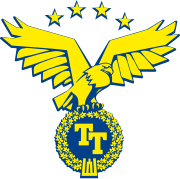Order and Justice Tvarka ir teisingumas | |
|---|---|
 | |
| Abbreviation | TT |
| Leader | Remigijus Žemaitaitis (last) |
| Founder | Rolandas Paksas |
| Founded | 9 March 2002[1] |
| Dissolved | 6 June 2020 |
| Split from | Liberal Union of Lithuania[1] |
| Merged into | Freedom and Justice[2] |
| Headquarters | Gedimino pr. 10 / Totorių g. 1, Vilnius |
| Membership | 12,043 (2018)[3] |
| Ideology | |
| Political position | Right-wing[8] |
| European affiliation | Alliance for Direct Democracy in Europe |
| European Parliament group | Union for Europe of the Nations (2004–2009) Europe of Freedom and Democracy (2009–2014) Europe of Freedom and Direct Democracy (2014–2019) NI (2019–2020) |
| Colours | Yellow Blue |
| Website | |
| www | |
Order and Justice (Lithuanian: Tvarka ir teisingumas, TT), formerly the Liberal Democratic Party (Liberalų Demokratų Partija, LDP) was a right-wing[8][9] national-conservative[5] political party in Lithuania that self-identified as "left-of-centre", at least on economic matters.[citation needed] It had eight members in the Seimas, the unicameral Lithuanian parliament, as of the last election it participated in (2016).
Formed as the 'Liberal Democratic Party' in 2002, the party achieved almost immediate success with the election of leader Rolandas Paksas as President of Lithuania within its first year. Paksas's impeachment led to the party reorganising itself as 'Order and Justice' to compete in the 2004 parliamentary election. Since then, it was the fourth-largest party in the Seimas, and finished third in the elections to the European Parliament and to the presidency.
The party sat on the right, possessed a radical and anti-establishment identity, and has been described as both socially conservative[6] and 'liberal' or 'right-liberal',[10] in line with its original identity.[11] Its support was strongest in the north-west Samogitia region.[6] The party's two MEPs sat in the Europe of Freedom and Direct Democracy group in the European Parliament, with the party having previously belonged to the now-defunct Union for Europe of the Nations (UEN) and Europe of Freedom and Democracy (EFD) groups.
In 2020, the party chairman Remigijus Žemaitaitis signed an agreement with the chairman of the Lithuanian Freedom Union (Liberals), Artūras Zuokas, and former MP Arturas Paulauskas to unite their political movements to form the Freedom and Justice party. Žemaitaitis was later expelled from said party and founded a new party called Dawn of Nemunas.
- ^ a b Krupavicius, Algis (December 2003). "Lithuania". European Journal of Political Research. 42 (7–8): 1010–20. doi:10.1111/j.0304-4130.2003.00128.x.
- ^ "P. Gražulis prašo teismo pašalinti iš Seimo rinkimų partiją "Laisvė ir teisingumas"". alfa.lt.
- ^ "Archived copy" (PDF). Archived from the original (PDF) on 2018-10-01. Retrieved 2019-06-22.
{{cite web}}: CS1 maint: archived copy as title (link) - ^ Lansford, Tom (2015), Political Handbook of the World 2015, CQ Press
- ^ a b Nordsieck, Wolfram (2016). "Lithuania". Parties and Elections in Europe. Archived from the original on 1 August 2020.
- ^ a b c Jurkynas, Mindaugas (June 2009). "The parliamentary election in Lithuania, October 2008". Electoral Studies. 28 (2): 329–33. doi:10.1016/j.electstud.2009.02.001.
- ^ Balcere, Ilze (2011), Comparing Populist Political Parties in the Baltic States and Western Europe (PDF), European Consortium for Political Research, pp. 5–6
- ^ a b c Ivaldi, Gilles (2011), "The Populist Radical Right in European Elections 1979–2009", The Extreme Right in Europe: Current Trends and Perspectives, Vandenhoeck & Ruprecht, p. 19
- ^ Jurkynas, Mindaugas (2012), "Lithuania", Life in Post-Communist Eastern Europe After EU Membership, Routledge, p. 123
- ^ Norbert Beckmann-Dierkes, Kristina Kviliūnaitė (October 9, 2012). "Litauen am Vorabend der Parlamentswahlen 2012". Retrieved 2023-01-12.
- ^ Krupavicius, Algis (December 2006). "Lithuania". European Journal of Political Research. 45 (7–8): 1166–81. doi:10.1111/j.1475-6765.2006.00673.x.